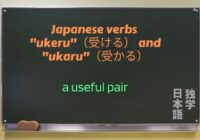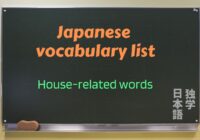Category Archives: Japanese Study: Intermediate
Interesting Japanese loanword: アピール (apiiru)
English-based Japanese loanwords are a double-edged sword. While on one hand they can give English-speakers a free ticket to understanding words used in Japanese, on the other hand Japanese loanwords can sometimes be different than their original counterparts, whether it is a minor nuance or a huge gap. In this post I’d like to go… Read More »
Japanese Poem Translation: “Darkness and Light” by Suzuko Nakano
Suzuko Nakano (中野 鈴子) (1906-1958) was a female Japanese poet born in Fukui prefecture who has, as far as I can tell, never been translated into English. This is my translation of her poem “闇と光と” (Darkness and Light). There is very little available about her in English online, but this is her Japanese Wikipedia page.… Read More »
Bilingual Japanese fairy tale translation: “The Accordion” by Ogawa Mimei
Japanese vocabulary list: Ki Aikido (martial arts) training words 
Japanese literature release: “Dreams of a Child: Mimei Ogawa: The Father of Modern Japanese Fairy Tales”
Japanese verbs “ukeru” (受ける) and “ukaru” (受かる): a useful pair
Japanese verbs often conveniently come in transitive/intransitive pairs, but sometimes those verbs don’t have the meanings you would expect. In this post I’d like to talk about “ukeru”(受ける) and “ukaru”(受かる), two verbs that are pretty important in daily life. The first of these, “ukeru” is the transitive one, which means it takes an object using… Read More »









